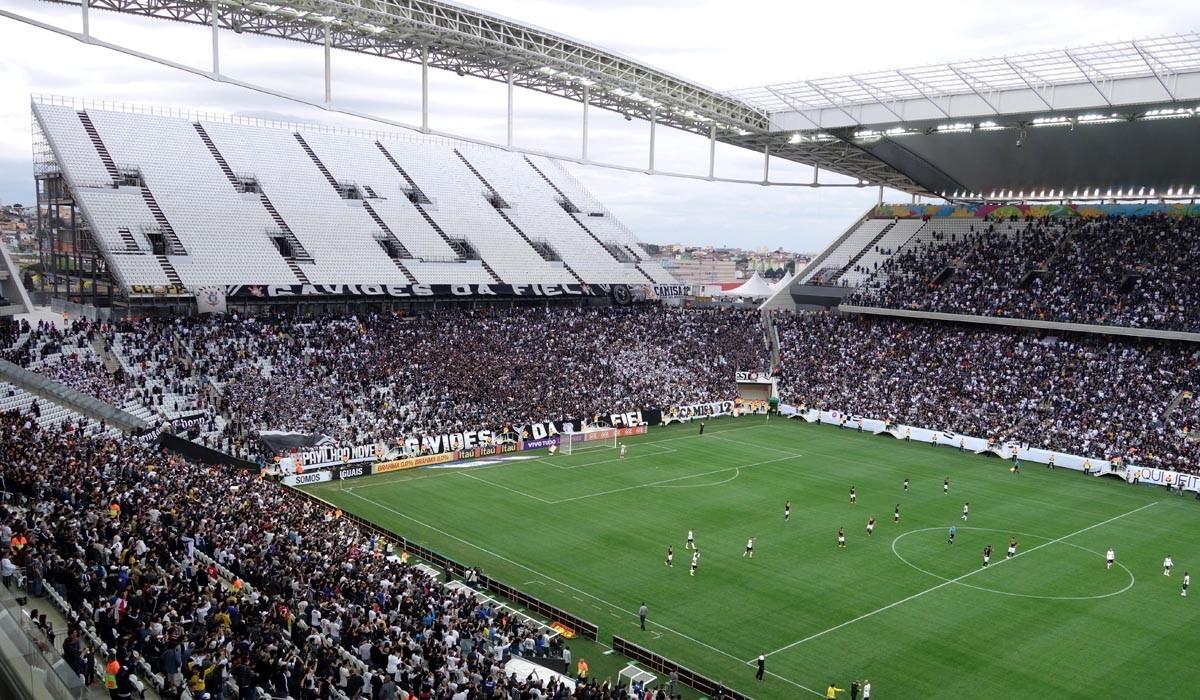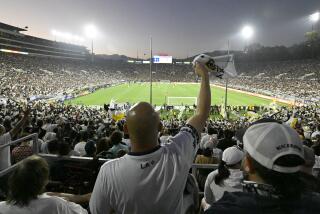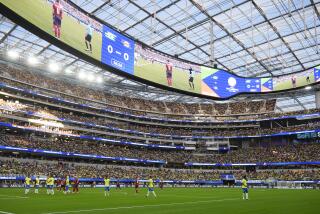Stadium for World Cup opener gets an incomplete on test run

- Share via
Reporting from Sao Paulo, Brazil — São Paulo’s unfinished soccer stadium hosted a final test match at partial capacity on Sunday, leaving parts of the new Itaquerao Stadium unproven before the FIFA World Cup starts here on June 12.
The fire department failed to approve use of one large seating area, meaning that the first time the entire 65,000-plus seat stadium will be used is the opening game between Brazil and Croatia. On Sunday, only 40,000 tickets were put on sale.
“The stadium is marvelous, but it’s not even finished! And that’s completely unacceptable,” said Fernando Martin, a 33-year-old construction worker and lifelong fan of Corinthians, which tied Rio de Janeiro opponent Botafogo, 1-1, Sunday. “It should have been done months ago.”
Brazil’s government has been locked in disputes with FIFA, soccer’s ruling body, over delays to stadium completions, as cost overruns have soured part of the Brazilian population on the event and provided ammunition for ongoing street protests. Before the game, thousands of the famously working-class Corinthians fans shouted protests outside about the high cost of tickets to the new stadium.
Along with Itaquerao, two other stadiums, in Natal and Porto Alegre, are not yet fully completed. The São Paulo stadium is likely to operate without the full use of a planned roof, and three workers died in accidents while the stadium was being built.
“A test event does not mean that fans on Sunday will find 100% of the services available that will be on offer during the FIFA World Cup,” read literature distributed by the local World Cup Organizing Committee at the game. “The tests are necessary exactly to correct imperfections and identify potential problems.”
Tens of thousands of Corinthians fans made their way easily on new public transportation to their new home field in South America’s largest city, and cheered enthusiastically as they took the lead, only to be disappointed in the second-half when Botafogo tied the score. The game went off without incident, but minor interior parts of the impressive stadium were visibly unfinished, with concrete walls exposed or construction materials lying on unused parts of the stands.
On fresh grass, Jadson fired in a shot from outside to box to put the Corinthians up in the first half, causing its highly organized, passionate fans — with one group dressed in the inmate uniform from the prison that gave them their name — to jump up and down on the new structure. At one point, the game had to be stopped to remove balloons from the grass.
During the World Cup, the new stadium will make use of two temporary seating structures, which will be removed after the tournament to leave it with a permanent capacity of 40,000. Local officials did not issue a safety permit for one of the two structures Sunday, and it sat empty above the fans.
“Our experience today was very positive, especially in terms of rail transport,” said Raquel Verdenacci, executive coordinator for the event from the state government. The official went on to explain that the full bleacher capacity could not be used because the fire department had not performed weight stress tests yet and would do so Wednesday. “There was no major incident involving public safety.”
At a news conference after the game, local media complained that fans had entered the game without tickets and others had been blocked at certain points around the stadium.
“Everything is going to get better, I have no doubt. By the semifinal match [on July 9], we’ll be able to run this place with our eyes closed,” said Tiago Pael, general manager for the São Paulo organizing committee. “Over the next week and a half, we have a lot of work to do.”
During the match, fans wandered from one section of the stadium to others, passing by empty stands and floors covered with tape. At one snack shop, five workers stood idly, only to inform approaching customers that they had no food to sell.
Brazil was awarded the World Cup in 2007, and games will take place in 12 cities.
“I’m a doctor, not an engineer,” said Jose Jorge Nicolau Jr. at halftime. “But Odebrecht, the construction company that built this place, is one of the country’s biggest. How could they not finish? It doesn’t make sense.”
sports@latimes.com
More to Read
Go beyond the scoreboard
Get the latest on L.A.'s teams in the daily Sports Report newsletter.
You may occasionally receive promotional content from the Los Angeles Times.










